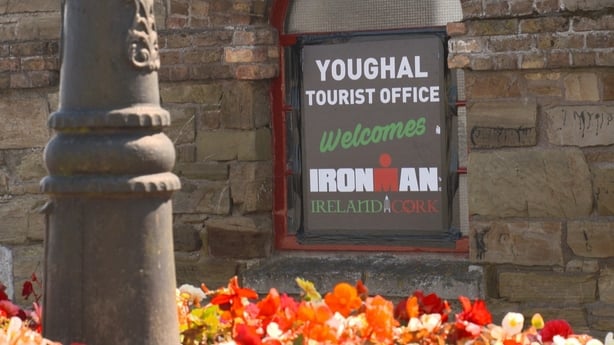Prime Time has obtained two previously unpublished reports which shed new light on what happened prior to the controversial Ironman Youghal event on 20 August in which two men died.
The reports, from Ironman and Triathlon Ireland, the national governing body of triathlons, set out both organisation's positions on what happened in the run up to the races.
Two races – one full distance race and another half-Ironman - proceeded despite concerns expressed about sea conditions on the day, with eyewitness footage showing large waves hitting many of the 2,000 race participants as they entered the water.
The reports highlight how a disagreement occurred on the morning of the race between the governing body and Ironman about the swim race course and the direction in which the swimmers would race.
Both reports indicate that Triathlon Ireland sought to change Ironman’s planned swim race course for the races, so that athletes could swim with the current, rather than against it.
However, the reports differ on how Triathlon Ireland voiced its opposition to Ironman’s planned course and what would happen if Ironman didn’t change it.

Triathlon Ireland say that they gave a "direction" that the swim course be changed, and that they would not sign the race permit unless it was done.
By contrast, the Ironman report states that this proposal was only a "suggestion" and that they were not made aware that the permit for the event depended on it.
Triathlon Ireland stated in the aftermath that it had not sanctioned the race to proceed.
At the time, Ironman contradicted this saying Triathlon Ireland had not communicated its refusal to sanction the event until after the race had concluded.
In a report submitted to Cork County Council, Ironman says that it believes Triathlon Ireland implicitly sanctioned the event by having Triathlon Ireland officials present at the race, however it also says that their events do not require such sanctioning.
Both accounts say there was no race permit signed by Triathlon Ireland and countersigned by the racer organiser, Ironman as is required for Triathlon Ireland officiated events.
Since the event, a coroner’s investigation into the deaths of 45-year-old Brendan Wall and 64-year-old Ivan Chittenden has been proceeding with the assistance of Gardai, who will prepare a file for an inquest to establish their cause of death.

Cork County Council, as host sponsor of the event, sought an account from Ironman, who the Council describe as having "sole responsibility for the management" of the event.
In its unpublished report to Cork County Council, obtained by Prime Time, Ironman states that it "does not formally require sanctioning by Triathlon Ireland."
It also states that "Triathlon Ireland has no authority to prevent an Ironman event from going ahead, nor does Ironman rely on Triathlon Ireland for assessing the safety of an Ironman event."
"Triathlon Ireland's role for our Irish events is to provide insurance to athletes based on an event sanctioning process and to officiate on-course whether athletes violate competition rules."
"Ironman has public liability cover for Ironman [the full-distance race] and Ironman 70.3 [the half-distance] of more than €6.5m and sanctioning by Triathlon Ireland does not impact that insurance cover."
"Ironman has the sole authority in deciding whether to start or continue an event."
In response to Prime Time, Triathlon Ireland says Ironman elected to seek their sanction when it filed a 'Race Request' with them January 2023.
It says that having made a request to host an event in Ireland, at which Triathlon Ireland officials would officiate, Ironman was "contractually obliged" to follow its rules. Triathlon Ireland says this includes the necessity to have a race permit signed by its officials and Ironman’s representatives before the race.
This didn’t happen.
In a statement on Thursday, Triathlon Ireland said it had appointed Grant Thornton to conduct an investigation into the circumstances surrounding the race.
"Questions need to be answered for the families and friends who lost loved ones and for the whole Triathlon community," Triathlon Ireland said.
It is Prime Time's understanding that Ironman will cooperate with this independent review and that it will make available its officials and any relevant information it holds to Grant Thornton.
In its internal report seen by Prime Time, Triathlon Ireland says that in all previous years occasions when Ironman hosted events in Youghal and elsewhere in Ireland since 2015, Ironman complied with its rules and obtained a permit in advance of the event.
It notes the race permit requires race organisers like Ironman to "agree to comply with Triathlon Ireland rules and regulations" and to "take safety and rules direction from the Triathlon Ireland Officials."
It says that when assessing the sea conditions around 6AM on the morning of the races, Triathlon Ireland officials observed an experienced lifeguard who entered the water and who subsequently "struggled to get through the breaking waves and was taken left by the current."
For this reason and given an imminent high tide, it says Triathlon Ireland officials relayed "safety concerns to Ironman about the proposed swim route going against the current."
The Triathlon Ireland report also says that before the event started their officials told Ironman representatives that they would not sign the race permit if they didn't change the course of the race. This is disputed by Ironman
It says Triathlon Ireland officials recommended a race change "so participants swam with the current".
Ironman’s account about what conversations occurred with Triathlon Ireland differs.
It says that Triathlon Ireland officials "suggested a route change" but that Ironman "received no direction" from Triathlon Ireland to do so, nor a clear indication that the race permit would not be signed if Ironman didn’t change the course of the swim race.
But why is having the sanction of governing body such an important issue?
According to sports technical official Hugh McAtamney it's about insurance and security for athletes.
"Public liability insurance is one of the reasons, not the only reason, but on race day, the race organisers want to know they have the backing of the federation. The athletes want to know that they're racing a safe race," Mr McAtamney said.
Both Triathlon Ireland and Ironman say that their insurance cover is in place.






